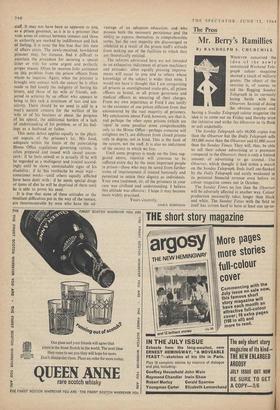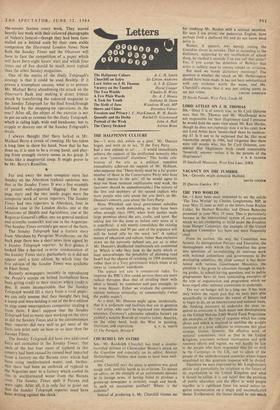The Press
Mr. Berry's Ramillies
By RANDOLPH S. CHURCHILL
The Sunday Telegraph sells 66,000 copies less than the Observer but the Daily .Telegraph sells 585,000 more than the Observer and 61,000 more than the Sunday Times. They will, thus, be able to sell their colour advertising at a premium compared to the Observer; there is only a limited amount of advertising to go around. The Observer, which thought it had stolen a march on the Sunday Telegraph, finds itself out-flanked by the Daily Telegraph and sorely weakened in its potential financial revenue even before its colour magazine comes out in October.
The Sunday Times no less than the Observer will be adversely affected in another way. Colour production necessarily takes longer than black and white. The Sunday Times with the field to itself has striven hard to have at least one up-to-
the-minute feature every week. They scored heavily last week with their coloured photographs of Nehru's funeral—though they had been fore- stalled on a limited scale by their own stable companion the Illustrated London News. Now both the Sunday Times and the Observer will have to face the competition of a paper which will have forty-eight hours' start and whioh four times out of five should be much more topical than the other Sunday magazines.
One of the merits of the Daily Telegraph's strategy is that it could be used flexibly. If it proves a triumphant success, what is to prevent Mr. Michael Berry abandoning the attack on the Observer's flank and making a direct frontal attack by transferring the coloured magazine to the Sunday Telegraph for the final breakthrough followed by the mopping-up operations in the rear? After all, the object of the exercise is not to put on sale or revenue for the Daily Telegraph, ' which is riding high, wide and handsome; but to cripple or destroy one of the Sunday Telegraph's rivals.
I always thought that there lurked in Mr. Michael Berry a streak of cunning. He has taken a long time to show his hand. Now that he has done so, it is seen to be a strong hand; and play- ing from strength victory seems in his grasp. It looks like a magisterial coup. It might prove to be Mr. Berry's Ramillies.
qtr
Far and away the most complete story last Sunday on the Aberdeen typhoid epidemic was that in the Sunday Times. It was a fine example of patient well-organised 'digging.' The front page story and the two inside pages were the composite work of seven reporters. The Sunday Times had two reporters in Aberdeen, four in London (one at the London docks, one at the Ministries of Health and Agriculture, one at the Registrar-General's office, one on general medical and scientific research); and one in the Argentine. The Sunday Times certainly got most of the facts.
The Sunday Telegraph had a feature story from Aberdeen by Peregrine Worsthorne; on the back page there was a short news item signed by a Sunday Telegraph reporter. At first glance it looked like a hurried re-write condensation of the Sunday Times story, particularly as it did not appear until a later edition, by which time the first edition of the Sunday Times was available in Fleet Street.
Recently newspapers (notably in reproducing the People's scoops on bribed footballers) have been giving credit to their sources where credit is due, It seems inconceivable that the Sunday Telegraph would lift a story from a rival paper; we can only assume that they thought they had a scoop and were holding it out of the first edition to stop some unscrupulous competitor stealing it from them. I don't suppose that the Sunday Telegraph had as many men working on the story as did the Sunday Times and in the circumstances their reporter did very well to get most of the facts into print only an hour or so later than the Sunday Times.
The Sunday Telegraph did have two additional facts not contained in the Sunday Times: that each of the last four cases of typhoid in this country had been caused by corned beef imported from a factory on the Barana river which had been using unchlorinated water; and, further, that there had been an outbreak of typhoid in the Argentine near to a factory which cooled its tins in unchlorinated water from the Barana river. The Sunday Times spelt it Parana and were right. After all, it is only fair to point out that the Sunday Telegraph reporter must have been writing against the clock.



































 Previous page
Previous page